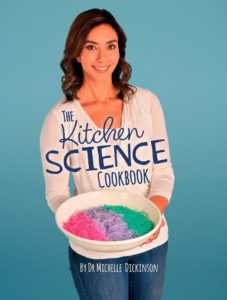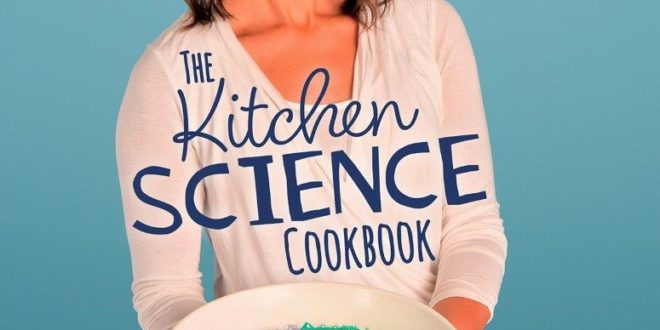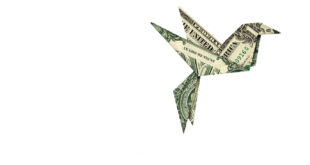 If I had only had a teacher like Nanogirl at school Science would have been a whole lot more interesting and fun!
If I had only had a teacher like Nanogirl at school Science would have been a whole lot more interesting and fun!
Nanogirl whose actual name is Dr Michelle Dickinson, is a well-known New Zealand scientist, engineer and columnist who is passionate about making children feel excited about science and turning them into the future problem solvers of the world.
She spent three years in her own kitchen developing, testing and refining a bunch of scientific experiments which families can do together. To make sure that they were well tested and family friendly she sent out a request on Facebook thinking only a few people would reply. But within 24 hours she was inundated with 2500 offers from mums and dads from 24 countries keen to help.
The top 50 were eventually chosen to go into the beautifully illustrated The Kitchen Science Cookbook. Its glossy pages mean that messy finger marks will easily wipe off. The experiments are set out in a step-by-step way just like the recipes in a cookery book. And each is as easy (or easier) than baking a cake.
Some of us remember Science as a subject at school in which you were told what to do rather than to think for yourself, which had little relevance to real life and involved a lot of rote learning. If that’s the case for you, do not be put off taking a look inside this book. Dr Dickinson shows it doesn’t have to be that way. You don’t even have to be in a classroom because science is everywhere and for everyone.
Her experiments are a fun way of learning about physics, chemistry and biology while using construction and building techniques vital for budding engineers
No previous scientific experience is necessary so don’t be afraid to give them a go with your children or grandchildren. They will love it!
You can easily turn your kitchen into a laboratory! No bunsen burners or test tubes or pipettes or other laboratory tools are needed, just some basic kitchen equipment.
You will already have most of the ingredients (such as milk, food colouring and baking soda) to hand. And as each recipe costs no more than a dollar they are very affordable.
Before starting each experiment children are encouraged to predict the result (a hypothesis) and to keep a notebook about what actually happens at each point of the experiment (the scientific process).
And after completing each experiment there are ideas for further exploring they can do by themselves.
The book is divided into nine sections: Colourful, construction, edible, electricity, motion, pressure, reaction, sound and surfactant experiments.
To whet your appetite here’s a taste of the experiments:
Marshmallow Catapults: Catapults have been used throughout history to launch objects at and over the walls of castles by converting potential energy to kinetic energy, This experiment uses the same theory but with objects you can eat.
Straw Rockets: Become your own rocket designer with this fun experiment that shows how mass, thrust and force are crucial for a successful launch
Unicorn Noodles: These amazing and edible unicorn noodles can transform from purple to blue or pink right in front of your eyes
Scrumptious Slime: This slime floats like a liquid but can be rolled like a solid- and the best part is that it is edible
Edible Earthworms: Using the power of crosslinking, these realistic looking worms not only look amazingly disgusting- they also taste great!
Marbled milk: Watch how a beautiful moving piece of ‘food art’ changes right in front of your eyes- thanks to the power of dishwashing liquid which breaks up the surface tension of the milk
Solar Cookie Oven: Usually ovens are powered using electricity or gas. This experiment uses the sun’s own natural energy-or solar power-to heat an oven that bakes cookies.
These experiments can be enjoyed by kids of all ages. You might even like to try them out with some old friends and ignite your own passion for science!
Dr Dickinson strongly believes that every child should have the opportunity to learn and become excited about science.
So she is generously donating a copy of The Kitchen Science Cookbook for each one that you purchase from nanogirl-labs.myshopify.com to a school, community or family that might not normally have access to it.
The Kitchen Science Cookbook by Dr Michelle Dickinson is published by Nanogirl Labs Ltd. RRP $50
Reviews by Lyn Potter
Parent and grandparent, Avid traveller, writer & passionate home cook








Join the Discussion
Type out your comment here:
You must be logged in to post a comment.